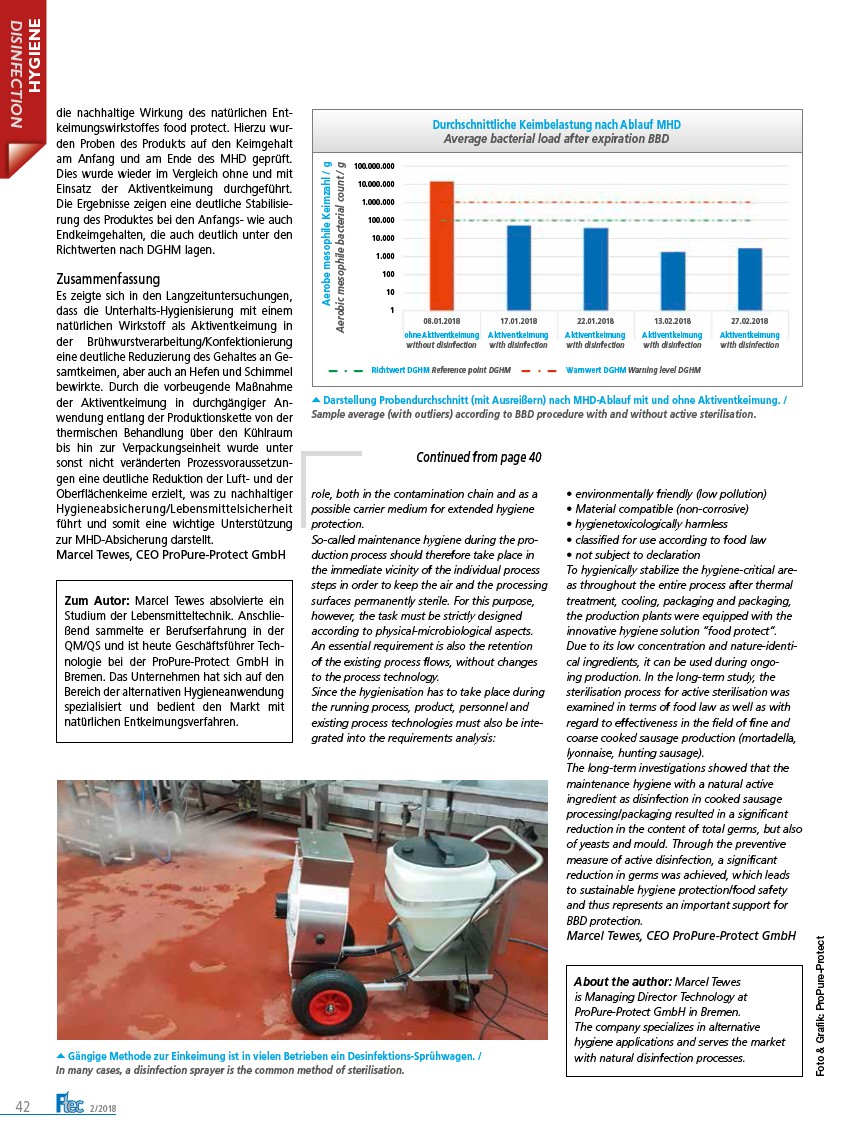
Continued from page 40
role, both in the contamination chain and as a
possible carrier medium for extended hygiene
protection.
So-called maintenance hygiene during the production
process should therefore take place in
the immediate vicinity of the individual process
steps in order to keep the air and the processing
surfaces permanently sterile. For this purpose,
however, the task must be strictly designed
according to physical-microbiological aspects.
An essential requirement is also the retention
of the existing process flows, without changes
to the process technology.
Since the hygienisation has to take place during
the running process, product, personnel and
existing process technologies must also be integrated
into the requirements analysis:
die nachhaltige Wirkung des natürlichen Entkeimungswirkstoffes
food protect. Hierzu wurden
Proben des Produkts auf den Keimgehalt
am Anfang und am Ende des MHD geprüft.
Dies wurde wieder im Vergleich ohne und mit
Einsatz der Aktiventkeimung durchgeführt.
Die Ergebnisse zeigen eine deutliche Stabilisierung
des Produktes bei den Anfangs- wie auch
Endkeimgehalten, die auch deutlich unter den
Richtwerten nach DGHM lagen.
Zusammenfassung
Es zeigte sich in den Langzeituntersuchungen,
dass die Unterhalts-Hygienisierung mit einem
natürlichen Wirkstoff als Aktiventkeimung in
der Brühwurstverarbeitung/Konfektionierung
eine deutliche Reduzierung des Gehaltes an Gesamtkeimen,
aber auch an Hefen und Schimmel
bewirkte. Durch die vorbeugende Maßnahme
der Aktiventkeimung in durchgängiger Anwendung
entlang der Produktionskette von der
thermischen Behandlung über den Kühlraum
bis hin zur Verpackungseinheit wurde unter
sonst nicht veränderten Prozessvoraussetzungen
eine deutliche Reduktion der Luft- und der
Oberflächenkeime erzielt, was zu nachhaltiger
Hygieneabsicherung/Lebensmittelsicherheit
führt und somit eine wichtige Unterstützung
zur MHD-Absicherung darstellt.
Marcel Tewes, CEO ProPure-Protect GmbH
Aerobe mesophile Keimzahl / g
Aerobic mesophile bacterial count / g
100.000.000
10.000.000
1.000.000
100.000
10.000
1.000
100
10
1
Durchschnittliche Keimbelastung nach Ablauf MHD
Average bacterial load after expiration BBD
08.01.2018
ohne Aktiventkeimung
without disinfection
17.01.2018
Aktiventkeimung
with disinfection
22.01.2018
Aktiventkeimung
with disinfection
13.02.2018
Aktiventkeimung
with disinfection
Richtwert DGHM Reference point DGHM Warnwert DGHM Warning level DGHM
27.02.2018
Aktiventkeimung
with disinfection
Darstellung Probendurchschnitt (mit Ausreißern) nach MHD-Ablauf mit und ohne Aktiventkeimung. /
Sample average (with outliers) according to BBD procedure with and without active sterilisation.
Gängige Methode zur Einkeimung ist in vielen Betrieben ein Desinfektions-Sprühwagen. /
In many cases, a disinfection sprayer is the common method of sterilisation.
• environmentally friendly (low pollution)
• Material compatible (non-corrosive)
• hygienetoxicologically harmless
• classified for use according to food law
• not subject to declaration
To hygienically stabilize the hygiene-critical areas
throughout the entire process after thermal
treatment, cooling, packaging and packaging,
the production plants were equipped with the
innovative hygiene solution “food protect“.
Due to its low concentration and nature-identical
ingredients, it can be used during ongoing
production. In the long-term study, the
sterilisation process for active sterilisation was
examined in terms of food law as well as with
regard to effectiveness in the field of fine and
coarse cooked sausage production (mortadella,
lyonnaise, hunting sausage).
The long-term investigations showed that the
maintenance hygiene with a natural active
ingredient as disinfection in cooked sausage
processing/packaging resulted in a significant
reduction in the content of total germs, but also
of yeasts and mould. Through the preventive
measure of active disinfection, a significant
reduction in germs was achieved, which leads
to sustainable hygiene protection/food safety
and thus represents an important support for
BBD protection.
Marcel Tewes, CEO ProPure-Protect GmbH
Zum Autor: Marcel Tewes absolvierte ein
Studium der Lebensmitteltechnik. Anschließend
sammelte er Berufserfahrung in der
QM/QS und ist heute Geschäftsführer Technologie
bei der ProPure-Protect GmbH in
Bremen. Das Unternehmen hat sich auf den
Bereich der alternativen Hygieneanwendung
spezialisiert und bedient den Markt mit
natürlichen Entkeimungsverfahren.
About the author: Marcel Tewes
is Managing Director Technology at
ProPure-Protect GmbH in Bremen.
The company specializes in alternative
hygiene applications and serves the market
with natural disinfection processes.
HYGIENE
42 2 / 2018 DISINFECTION
Foto & Grafik: ProPure-Protect